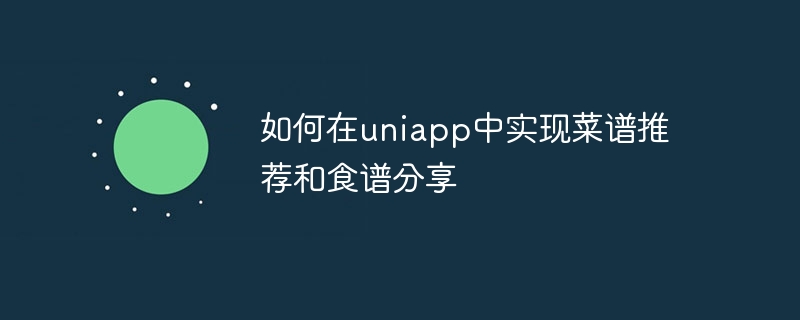Home >Web Front-end >uni-app >How to implement recipe recommendation and recipe sharing in uniapp
How to implement recipe recommendation and recipe sharing in uniapp
- 王林Original
- 2023-10-26 12:19:521430browse

How to implement recipe recommendations and recipe sharing in uniapp
As people pay more and more attention to healthy eating, the demand for obtaining recipe recommendations and sharing recipes is also increasing. high. In uniapp, we implement recipe recommendation and recipe sharing functions by using functions such as cloud development, interface requests, and components. This article will detail how to implement these two functions in uniapp and provide specific code examples.
1. Implementation of recipe recommendation function
- Create cloud development database
In the uniapp project, we first need to create a cloud development database to store Recipe data. In the developer tools, select "Cloud Development" and follow the prompts to create a cloud development environment.
- Add recipe data in the cloud development database
In the cloud development console, create a collection named "recipes" and add recipe data to the collection. Each recipe data includes fields such as dish name, picture, ingredients and method.
- Create a page to display recipe recommendations
In the uniapp project, create a page named "recommend" to display recommended recipes. In the vue file of this page, the recipe data in the cloud database is obtained through the API request of cloud development and displayed on the page.
Code example: recommend.vue
<template>
<view>
<view v-for="(recipe, index) in recipeList" :key="index">
<image :src="recipe.image"></image>
<text>{{recipe.name}}</text>
<text>{{recipe.ingredients}}</text>
<text>{{recipe.steps}}</text>
</view>
</view>
</template>
<script>
export default {
data() {
return {
recipeList: []
}
},
async created() {
const db = uniCloud.database()
const res = await db.collection('recipes').limit(5).get()
this.recipeList = res.data
}
}
</script>
<style>
/* 样式 */
</style>2. Implementation of recipe sharing function
- Create a page for sharing recipes
In the uniapp project, create a page named "share" for sharing recipes. In the vue file on this page, users can enter relevant information about the recipe, including fields such as dish name, pictures, ingredients, and methods.
Code example: share.vue
<template>
<view>
<input v-model="recipe.name" type="text" placeholder="菜名"></input>
<input v-model="recipe.image" type="text" placeholder="图片"></input>
<input v-model="recipe.ingredients" type="text" placeholder="食材"></input>
<input v-model="recipe.steps" type="text" placeholder="做法"></input>
<button @click="shareRecipe">分享食谱</button>
</view>
</template>
<script>
export default {
data() {
return {
recipe: {
name: '',
image: '',
ingredients: '',
steps: ''
}
}
},
methods: {
async shareRecipe() {
const db = uniCloud.database()
await db.collection('recipes').add(this.recipe)
uni.showToast({
title: '分享成功',
duration: 2000
})
}
}
}
</script>
<style>
/* 样式 */
</style>The above is a specific code example to implement the recipe recommendation and recipe sharing functions in uniapp. Through the above code, we can implement a simple recipe recommendation and sharing platform in uniapp, where users can browse recommended recipes and share their own recipes. Of course, according to actual needs, we can further improve the functions and beautify and optimize the interface. Hope this article is helpful to you.
The above is the detailed content of How to implement recipe recommendation and recipe sharing in uniapp. For more information, please follow other related articles on the PHP Chinese website!

